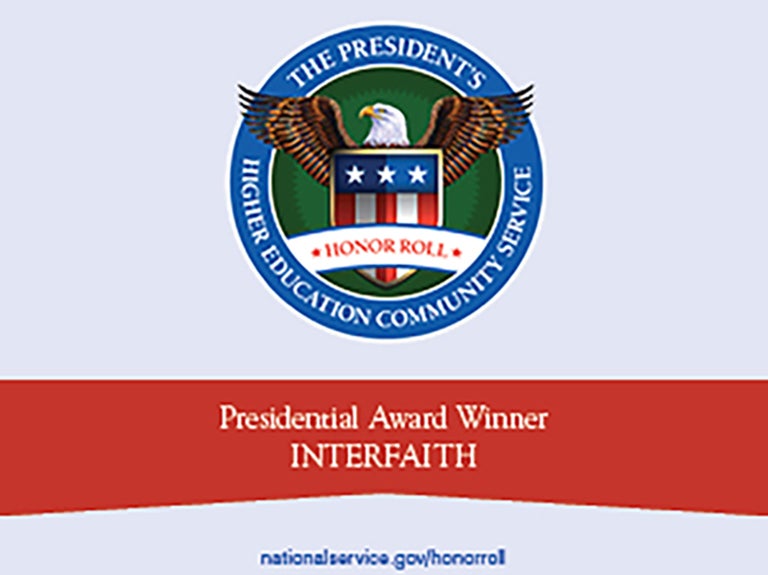Title: Georgetown Earns Prestigious White House Honor for Interfaith Community Service
Georgetown wins the White House’s Interfaith Community Service Award for fostering meaningful relationships among its community members of differing faiths and backgrounds.

Oct. 31, 2016 – The university has won the White House’s Interfaith Community Service Award for fostering meaningful relationships among its community members of differing faiths and backgrounds.
The award, recently announced by the Corporation for National and Community Service (CNCS), landed the university on the 2015 President’s Higher Education Community Service Honor Roll, the highest honor an educational institution can receive for its commitment to volunteerism, community-based learning and civic engagement.
Three Georgetown entities contributed to the receipt of the award through an in-depth application and review process – the Center for Social Justice Research, Teaching, and Service (CSJ), the Office of Campus Ministry, and the Berkley Center for Religion, Peace, and World Affairs.
“We are honored to be recognized with an award from the President’s National Community Service Honor Roll and specifically for the deep commitment that we hold to how we do this work – with a value and lens on interfaith relationships and a faith that does justice,” says Andria Wisler, CSJ’s executive director. “While Hoyas do not engage in service for the recognition, it is surely welcome to receive accolades from the highest federal recognition possible.”
Social Justice and Ministry
The Center for Social Justice, created in 2001, promotes and integrates community-based research, teaching and service by collaborating with diverse partners and communities.
Across the entire university, more than 8,000 Georgetown students of all different faiths and traditions contributed more than 770,000 community service hours in 2015.
The Office of Campus Ministry at Georgetown supports Roman Catholic, Protestant, Orthodox Christian, Jewish, Muslim and Hindu chaplaincies as well as Buddhist and Latter-day Saints student groups, a variety of affiliated ministries and numerous interreligious retreats, programsand services.
Georgetown hired the first full-time Jewish chaplain at a Catholic university in the late 1960s, and it was also the first American university to hire a full-time Muslim chaplain in the late 1990s. This fall the university became the first U.S. college to hire a full-time Hindu priest as a chaplain.
“From its foundation by John Carroll, Georgetown University has honored the harmony of religious faiths that has given glory to God and furthered the dignity of every human person,” says Rev. Howard Gray, S.J., vice president for mission and ministry. “This honor celebrates our tradition of dialogue and civic service that continues to characterize our diverse religious culture. We are humbled and honored by this recognition.”
Highlighted Programs
The university’s Magis Immersion Program, co-led by the Office of Campus Ministry and CSJ, offers six immersion experiences, which take place during school breaks, for students, faculty and staff of all religious traditions.
“The program is designed to build relationships, cultivate awareness of social justice and engage in reflection and solidarity with those on the margins in developing countries and under-resourced communities,” Wisler says.
The university’s Berkley Center, which is celebrating its 10th anniversary this year, supports a variety of activities that encourage interfaith dialogue, reflection and service work through its Doyle Engaging Difference Program.
The center also coordinates the International Higher Education Interfaith Leadership Forum, which connects international scholarship and work on faith and service to the President’s Interfaith and Community Service Campus Challenge.
“For the past 10 years, the Berkley Center has focused on forming students – through service and teaching – into adults who appreciate the value of interfaith dialogue and understand how their work serving others is elevated by engaging with people of different religious and cultural backgrounds,” says Thomas Banchoff, the center’s director and the university’s vice president for global engagement. “We are pleased to see our efforts and those of the entire Georgetown community recognized by the White House.”
Everyday Commitment
“Service and higher education go hand-in-hand,” said Wendy Spencer, CEO of the Corporation for National and Community Service (CNCS). “Every day these colleges and universities inspire young leaders to commit to solving problems alongside community members.”
“By recognizing institutions like Georgetown University that are pioneers in achieving meaningful, measurable results for their communities, we also highlight the critical role all higher education institutions play in addressing community challenges and placing more students on a lifelong path of civic engagement,” she adds.
A total of 766 higher education institutions were named to the 2015 President’s Higher Education Community Service Honor Roll. Of these, only 16 were named as finalists, with four in each category.
CNCS, the federal agency for volunteering and service, has administered the Award since 2006 in collaboration with the U.S. Department of Education and the U.S. Department of Housing and Urban Development, as well as the American Council on Education, Campus Compact and the Interfaith Youth Core.